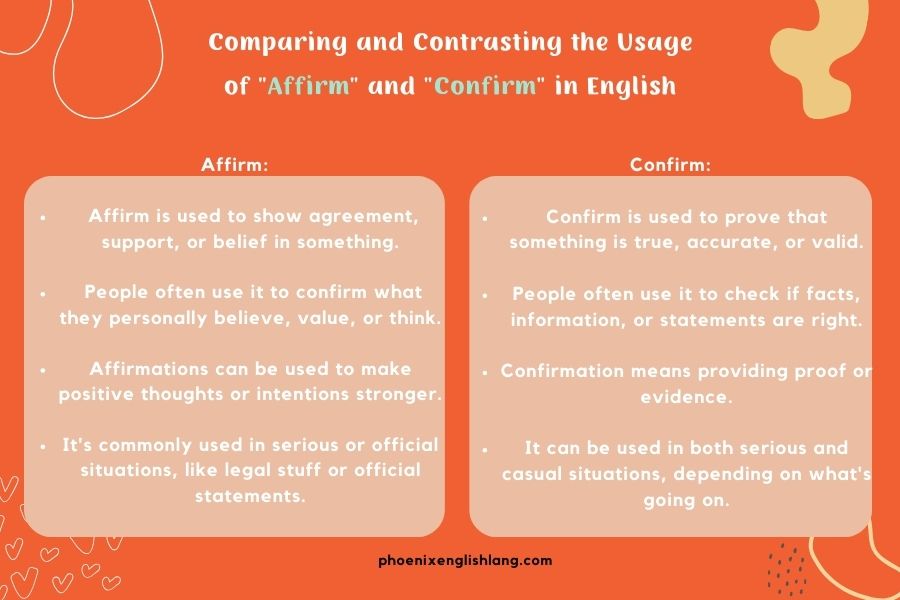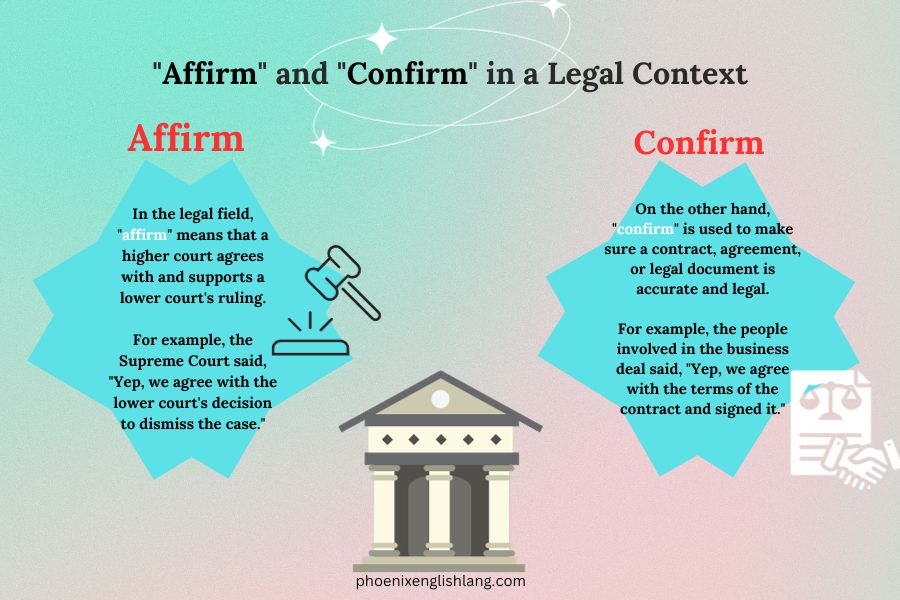Affirm and confirm are like these two words that people use a lot in English, and they kinda mean the same thing but are used in different situations.
Knowing the differences between these two words is super important if you wanna communicate well.
In this article, we’re gonna check out ten ways affirm vs confirm are different from each other.
Affirm and confirm are like these two words that people use a lot in English, and they kinda mean the same thing but are used in different situations. Understanding the nuances between these two words can significantly enhance your communication skills, making your speech and writing more precise and effective.
While both words convey a sense of agreement or validation, their applications and connotations differ, which is why it’s essential to grasp their distinct uses.
Knowing the differences between these two words is super important if you wanna communicate well. When you use the right word in the right context, you not only convey your message more clearly but also demonstrate a better command of the English language. This can be particularly beneficial in professional settings, academic writing, and everyday conversations where clarity and accuracy are paramount.
In this article, we’re gonna check out ten ways affirm vs confirm are different from each other. By exploring these differences, you will gain a deeper understanding of how to use each word appropriately, ensuring that your communication is both effective and nuanced.
Firstly, let’s delve into the definitions. To affirm means to state something positively or assertively. It often involves expressing support or agreement with a statement or belief.
For example, when you affirm someone’s feelings, you are acknowledging and validating their emotions. On the other hand, to confirm means to establish the truth or correctness of something.
It involves verifying or validating information, often through evidence or additional information. For instance, you might confirm a reservation or confirm the details of a meeting.
Another key difference lies in their usage in legal and formal contexts. Affirm is frequently used in legal settings to indicate a formal declaration of truth or support. For example, a witness in court may affirm their testimony, meaning they declare it to be true.
Confirm, however, is more commonly used in administrative or procedural contexts. For instance, confirming an appointment or confirming receipt of an email involves verifying that the information is accurate and acknowledged.
The emotional undertones of these words also differ. Affirm often carries a positive connotation, as it involves expressing support or agreement. It can be empowering and validating, making it a useful word in contexts where encouragement or affirmation is needed.
Confirm, while neutral, is more about accuracy and verification. It doesn’t necessarily carry the same emotional weight as affirm but is crucial for ensuring that information is correct and reliable.
In terms of grammar, affirm is typically followed by a clause or statement that is being affirmed. For example, “She affirmed that she would attend the meeting.”
Confirm, on the other hand, is often followed by a noun or noun phrase that is being confirmed. For example, “He confirmed the date of the event.”
The contexts in which these words are used can also vary. Affirm is often used in discussions about beliefs, values, and personal statements.
It is a word that conveys a sense of personal conviction and support. Confirm is more commonly used in contexts involving information, logistics, and verification processes. It is a word that conveys a sense of accuracy and reliability.
Understanding these differences can help you choose the right word for the right situation, enhancing your ability to communicate effectively.
For instance, if you want to express support for someone’s idea, you might say, “I affirm your perspective.” If you need to verify the details of a plan, you might say, “Can you confirm the schedule?”
By the end of this article, you will have a thorough understanding of how to use affirm and confirm correctly.
You will be able to distinguish between their meanings and applications, ensuring that your communication is both precise and effective. So, let’s dive into the ten key differences between affirm and confirm, and explore how mastering these words can improve your English language skills.
which one is right – Affirm or Confirm? What’s the main answer?

“Affirm” and “confirm” are both correct verbs in English, but which one you choose depends on the specific situation and what you mean.
If you want to agree with, support, or believe in something, go with “affirm.” For example, you can affirm your commitment to a cause or affirm your belief in a certain ideology.
On the other hand, if you want to prove or make sure something is true or accurate, go with “confirm.” You would use “confirm” when checking facts, validating information, or making sure a statement or claim is correct.
So, there’s no one right answer for whether “affirm” vs “confirm” is better.The important thing is to understand what you mean and the context of what you’re saying or asking.
You might also enjoy: Sensitive Vs Sensible [Video + Examples] 2023
20 points about using Affirm and Confirm
- “Affirm” and “confirm” are two distinct words with different meanings and contextual uses.
- “Affirm” means to state something positively or to uphold a belief or statement as true.
- “Confirm” means to establish the truth or correctness of a fact, statement, or decision.
- Understanding the difference between “affirm” and “confirm” is crucial for accurate communication.
- “Affirm” is often used in the context of expressing agreement, support, or adherence to a belief or principle.
- “Confirm” is commonly used to validate or verify information, reservations, appointments, or arrangements.
- Using “affirm” conveys a sense of assertion, endorsement, or validation of a statement or belief.
- Using “confirm” indicates the act of making sure something is accurate, valid, or true.
- Incorrect interchange of “affirm” and “confirm” can lead to confusion and misunderstanding in communication.
- Both “affirm” and “confirm” play vital roles in affirming or validating information, but in different contexts.
- Properly using “affirm” and “confirm” enhances the clarity and precision of written and verbal communication.
- “Affirm” is commonly associated with stating a position, opinion, or belief with conviction or certainty.
- “Confirm” is often used to verify the accuracy of details, reservations, appointments, or plans.
- Individuals should be mindful of using the appropriate word, “affirm” or “confirm,” based on the intended meaning of their message.
- Understanding the nuance between “affirm” and “confirm” helps convey intentions accurately in professional and personal communication.
- “Affirming” typically involves expressing a positive belief or support, while “confirming” involves validating or verifying information.
- Both “affirm” and “confirm” are essential components of effective communication across various contexts and situations.
- Utilizing the correct term, “affirm” or “confirm,” ensures that the intended message is conveyed accurately and comprehensively.
- Mastery of the differences between “affirm” and “confirm” showcases a strong command of language and communication skills.
- Embracing the distinctions between “affirm” and “confirm” empowers individuals to communicate confidently and effectively in diverse settings.
1.Exploring Usage and Meanings of “Affirm” and “Confirm” in English
Affirm and confirm are two verbs in English that basically mean the same thing but are used in different situations.
Let’s dig into the meanings of each word and compare them:
1.Affirm: Affirm means to say or declare something in a positive way.
It’s often used to show agreement, support, or belief in something.When you affirm something, you’re basically saying that it’s true or valid based on your own conviction or opinion.
Affirmations can be used to reinforce positive thoughts, beliefs, or values.For example, you might affirm your dedication to a goal or affirm your faith in a certain philosophy.
2.Confirm: Confirm means to check or confirm something.
It’s used to make sure that a statement, fact, or claim is true or accurate.When you confirm something, you’re giving evidence or proof to support its validity.Confirmation involves making sure that the information or belief is accurate and trustworthy.
For instance, you might confirm a reservation, confirm the details of a meeting, or confirm the accuracy of a news report.Even though both affirm and confirm involve expressing certainty, they differ in terms of the situation and purpose.
Affirmation is more subjective and based on personal opinion or belief, while confirmation is more objective and based on verifiable evidence or facts.Affirmation is often used to express personal convictions or support, while confirmation is used to establish the truth or accuracy of something.
To sum it up, affirm is used to positively state something based on personal conviction or belief, while confirm is used to verify or validate something based on evidence or facts. The choice between affirm and confirm depends on the specific situation and intended meaning of what you’re saying or asking.
2.Comparing and Contrasting the Usage of “Affirm” and “Confirm” in English

The usage of “affirm” and “confirm” in English can be compared and contrasted based on what they mean and where they’re used.Here’s a breakdown of how they’re used:
1.Affirm:
– Affirm is used to show agreement, support, or belief in something.
– People often use it to confirm what they personally believe, value, or think.
– Affirmations can be used to make positive thoughts or intentions stronger.
– It’s commonly used in serious or official situations, like legal stuff or official statements.
2.Confirm:
– Confirm is used to prove that something is true, accurate, or valid.
– People often use it to check if facts, information, or statements are right.
– Confirmation means providing proof or evidence.
– It can be used in both serious and casual situations, depending on what’s going on.
While both “affirm” and “confirm” mean agreeing or proving something, they’re different in what they focus on and how they’re used. Affirmation is all about personal beliefs or support, and it’s more about what someone feels.
Confirmation, though, is about facts and what’s true, and it’s more about checking or proving things. To sum it up, “affirm” is used to show agreement or support, usually in a personal or subjective way.
“Confirm” is used to prove what’s true or accurate, and it relies on evidence or checking.Understanding what your statement or question is about will help you decide if “affirm” or “confirm” is a better choice.
3.Comparing the Vibes of “Affirm” and “Confirm” in English: Understanding the Tone and Context
The vibes of “affirm” and “confirm” in English can be different depending on the situation.
Here’s a comparison of the vibes of these two words, with some examples:
1.Affirm: The vibe of “affirm” is usually positive, confident, and assertive.
It’s used to show agreement, support, or belief in something.
The vibe can be formal or informal, depending on the situation.
Example 1: “I totally affirm my commitment to this project and will do everything I can to make it successful.”
Example 2: “She totally affirmed her belief in the importance of education for all kids.”
2.Confirm: The vibe of “confirm” is more about facts and objectivity.
It’s used to establish the truth or accuracy of something. The vibe can be formal or informal, depending on the context.
Example 1: “Just let me know if you’re coming to the meeting by replying to this email, okay?”
Example 2: “The DNA test results confirmed that he’s really the child’s biological parent.”
When you compare them, “affirm” has a vibe that’s all about personal conviction and support, while “confirm” is more focused on checking and validating information.
The vibe of “affirm” is more subjective, based on personal beliefs or opinions, while the vibe of “confirm” is more objective, based on evidence or facts.
It’s important to think about the right vibe to use when using these words to make sure you’re communicating effectively and getting across what you mean in a given situation.
You might also enjoy: Difference Between Ensure VS Make Sure [2023]
4. “Affirm” and “Confirm” in a Legal Context

Both “affirm” and “confirm” have specific meanings and usage in a legal context.
In the legal field, “affirm” means that a higher court agrees with and supports a lower court’s ruling.
For example, the Supreme Court said, “Yep, we agree with the lower court’s decision to dismiss the case.”
On the other hand, “confirm” is used to make sure a contract, agreement, or legal document is accurate and legal.
For example, the people involved in the business deal said, “Yep, we agree with the terms of the contract and signed it.”
So basically, “affirm” is when a higher court supports a lower court’s decision, and “confirm” is when you make sure legal stuff is right.
But remember, the way these words are used might be different depending on the laws and stuff where you are.
So it’s always a good idea to ask a lawyer or look up the rules.
5. “Affirm” and “Confirm” in English: Exploring the Nuances of Personal Beliefs
When it comes to personal beliefs, “affirm” and “confirm” mean different things and are used differently in English.
“Affirm” is often used to express and assert personal beliefs or values.
It shows a strong conviction or support for a certain idea or principle.
Like: “She affirms her commitment to protecting the environment.”
In these examples, “affirm” is used to emphasize a personal stance or conviction, reinforcing one’s belief in a specific concept or cause.
On the other hand, “confirm” is used to validate or verify existing beliefs or knowledge. It means looking for evidence or proof to support one’s beliefs.
For instance:
1.”The scientific study confirmed that I was right about the benefits of regular exercise.”
2.”The historical evidence confirmed that I was correct about the account.”
In these cases, “confirm” is used to validate one’s beliefs through external sources or objective information.
Even though both verbs are related to personal beliefs, “affirm” focuses on asserting or supporting one’s beliefs, while “confirm” focuses on seeking validation or verification of existing beliefs through evidence or facts.
It’s important to note that personal beliefs are subjective and can vary from person to person.
The choice between “affirm” and “confirm” depends on the specific intention and emphasis one wants to convey when talking about personal beliefs.
You might also enjoy: Have Vs Had: Complete Grammatical Guide [2023 Method]
6. “Affirm” and “Confirm” in a Religious Context

In a religious context, both “affirm” and “confirm” have big meanings and are used in different ways.
Let’s check out what these words mean in religion and compare how they are used with some examples.
“Affirm” is often used in religious settings to show faith, belief, or commitment to religious teachings or principles.
It means a personal conviction or declaration of someone’s religious beliefs. For example, a person might affirm their belief in God or affirm their commitment to living a good life according to their religion.
This use emphasizes the person’s personal connection and dedication to their religious beliefs.
On the other hand, “confirm” is commonly used in religion to make sure or approve religious sacraments or rituals.
It means the act of confirming or verifying the truth or validity of a religious practice or ceremony.
For instance, in Christianity, the sacrament of Confirmation is a ceremony where people publicly confirm their faith and receive the Holy Spirit.
This act confirms their commitment to the Church’s teachings and their acceptance of the sacrament.
While “affirm” focuses on personal belief and commitment, “confirm” focuses on the validation and acceptance of religious practices.
“Affirm” is subjective, showing an individual’s personal conviction, while “confirm” is more objective, involving the acknowledgment and acceptance of established religious traditions.
To show this further, look at these examples:
1.Affirm: “I affirm my belief in the teachings of Buddhism and try to follow the Eightfold Path in my daily life.”
2.Confirm: “Through the sacrament of Baptism, we confirm our initiation into the Christian faith and become members of the Church.”
In these examples, “affirm” shows personal belief and commitment to a religious ideology, while “confirm” means the validation and acceptance of religious rituals or sacraments.
In conclusion, in a religious context, “affirm” is used to show personal belief and commitment to religious principles, while “confirm” is used to validate and accept religious practices or sacraments.
Understanding the differences between these words helps people communicate their religious beliefs and take part in religious rituals with clarity and accuracy.
7. “Affirm” vs “Confirm” in English for Certainty and Conviction
When it comes to being sure about something, there’s a little difference between saying “affirm” and “confirm” in English.
“Affirm” means you really believe what you’re saying or thinking. You’re saying it with confidence and no doubt.
For example:
1.”I affirm that I will finish the project on time.” (Strongly committing to and being sure about finishing on time)
2.”She affirmed her belief in education.”
(Being really convinced and sure about the importance of education) On the other hand, “confirm” means you’re checking if what you know or believe is true.
You’re getting evidence or proof to support it.It doesn’t necessarily mean you have the same level of personal conviction as with “affirm.”
For example:
1.”The test results confirmed that the virus is there.” (Checking and validating if the test results are accurate)
2.”The witness confirmed that the suspect was somewhere else.”
(Providing evidence to support the accuracy of the suspect’s alibi) In both cases, you’re sure about something, but “affirm” emphasizes personal conviction and belief, while “confirm” focuses on checking and supporting information with evidence or proof.
It’s important to know that choosing between “affirm” and “confirm” depends on the specific situation and what you mean.Understanding these small differences can help you show how sure you are in a given situation.
You might also enjoy: Only Vs Just All You Need to Know + Examples
8.Understanding the Distinction: “Affirm” vs. “Confirm” in English

When it comes to using “affirm” and “confirm” in English, there are some differences to think about.When you affirm something, you usually express agreement, support, or belief in it. If someone asks, “Do you think climate change is real?” for instance.
you could say, “Yes, I totally believe in climate change and how it affects our planet.”On the other hand, when you confirm something, you usually give evidence or proof to prove it’s true If someone asks, “Can you confirm if the meeting is tomorrow?” for example.
you might say, “Yes, I can confirm that the meeting is tomorrow at 2 PM in the conference room.”When you affirm something, it usually shows your personal convictions or beliefs, while confirming something is more objective and factual.
It’s important to note that the appropriate response depends on the context and the specific question or statement.Sometimes both affirming and confirming can be used, while in other cases, only one is suitable.
In summary, affirming means expressing agreement or support based on personal beliefs, while confirming means providing evidence or proof to prove something.The choice between the two depends on the context and the nature of the question or statement.
9.Understanding the Distinction: “Affirm” and “Confirm” in Formal Usage
Both “affirm” and “confirm” can be used in formal situations, but there are some slight differences in how they are used.”Affirm” is seen as more formal than “confirm.” It is commonly used in legal, official, or professional settings where a strong and confident statement is needed.
For example, in a court of law, a judge might affirm a decision to show strong agreement with the lower court’s ruling. In a formal setting like a business meeting or professional presentation, affirming a statement or belief can convey a sense of conviction and confidence.
On the other hand, “confirm” is a flexible verb that can be used in both formal and informal situations. It is often used to validate or verify information, facts, or arrangements.For instance, confirming a reservation, confirming attendance to an event, or confirming the accuracy of data are all examples of how “confirm” is used.
In formal situations like business correspondence or official documents, “confirm” is often used to provide an official endorsement or validation. While both verbs can be used formally, “affirm” has a stronger sense of conviction and authority, which makes it more suitable for situations where a firm and assertive statement is needed.
“Confirm,” on the other hand, is a more neutral and flexible verb that can be used in a wider range of formal and informal situations. In summary, “affirm” is generally seen as more formal and is used to express strong agreement or belief, while “confirm” is a versatile verb that can be used in both formal and informal situations to validate or verify information.
10.The Difference Between “Affirm” and “Confirm” in English: Understanding Subjectivity and Facts

When it comes to subjectivity, there’s a difference between “affirm” and “confirm” in English.”Affirm” is a verb that people often use to express what they personally believe or think. It’s all about personal opinions and perspectives.
For example, someone might affirm their support for a political candidate or affirm their belief in a certain philosophy.When you affirm something, you don’t really need any proof or external evidence.On the other hand, “confirm” is more about facts and less about personal feelings.
It’s all about checking or validating information or claims.Confirmation is all about evidence, proof, or finding outside sources to make sure something is true or accurate.For example, you might confirm a reservation by calling the hotel or confirm a scientific hypothesis by doing experiments and analyzing data.
Both “affirm” and “confirm” can be used to agree or show support, but the main difference is how personal they are.Affirmation is all about personal beliefs and opinions, while confirmation is all about facts and evidence.
In short, “affirm” is more about personal stuff, and “confirm” is more about checking facts.Knowing this can help you choose the right verb based on what you mean and the situation you’re talking about.
Conclusion
Understanding the diff between saying yes and saying yes again is really important for talking good in English.
By knowing the little differences in what they mean, when to use them, how they sound, and where they fit, you can say what you mean and not mess things up.
Whether you’re talking about what you believe, checking stuff out, or dealing with rules or religion, using these words right will make you better at talking and help people understand you.
Frequently Asked Questions
- What is the primary difference between “affirm” and “confirm” in English?
The main difference is that “affirm” is used to assert or uphold something positively, while “confirm” is used to validate or verify the truth or accuracy of something.
- How do the meanings of “affirm” and “confirm” differ in tone and intention?
“Affirm” carries a sense of agreement, support, or assertion, while “confirm” emphasizes verification, validation, or making something certain.
- Can you provide examples of how “affirm” and “confirm” are used in different contexts?
Sure, for example, one might “affirm their commitment to a cause” and “confirm a reservation at a hotel.”
- When would it be more appropriate to use “affirm” over “confirm” in a sentence?
It would be more appropriate to use “affirm” when expressing agreement, support, belief, or resolve, rather than verifying information.
- In what situations would one typically use “confirm” instead of “affirm”?
“Confirm” is commonly used when ensuring the accuracy of details, arrangements, appointments, or information.

Hi, welcome to my blog! My name is Omid and I am thrilled to have you here! I am an English language teacher with 12 years of experience and hold multiple international certifications (TESOL, IELTS, TOEFL, PTE, CELTA). Additionally, I hold a PhD in Applied Linguistics with a specialization in Teaching English as a Second Language (TESL), which fuels my passion for teaching English and assisting others in mastering the language. To me, nothing is more rewarding than helping individuals enhance their English language abilities through various methods. So, let’s embark on this journey of learning English together.




